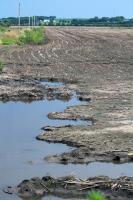Weed management issues related to the flooding and wet conditions in Missouri
Obviously, our season so far has been one for the books. Our state climatologist Pat Guinan tells us that last month was the wettest May on record ever! We’ve been fielding a number of questions over the past several weeks related to the wet weather and how this affects our herbicides and weed management practices. In this article, we present a few brief thoughts that provide some answers to the most common questions we’ve been getting.
New tests by MU scientists will kill weed seeds before they become weeds
COLUMBIA, Mo. - Kill seeds before they become hard-to-kill weeds. That plan will be studied by Kevin Bradley with help from Missouri farmers.The University of Missouri Extension weed specialist plans research on crushing seeds before they hit the ground. That stops weeds competing with crops next season. Over time, that depletes soil seed banks.
New Region C training coordinator appointed at MU FRTI
Region C Training Coordinator: Aaron Bockhorst of Union, Missouri.
University of Missouri leads call for broadband
Editorial by Marshall Stewart, vice chancellor for extension and engagement and chief engagement officer for UM System.
Christine Tew: 4-H helped plant the seed for ‘growing my network’
Christine Tew"Home team" typically refers to a favorite sports team. But Christine Tew’s home team is made up of the people who root hardest for her.
Beth Snyder: A childhood passion to a successful business
Beth SynderAs kids we often respond to the question, "What do you want to be when you grow up?" with answers like a princess, an astronaut, or superhero. The reality 20 years later is almost never the same. However, for Beth Snyder, that is not the case.
Dicamba labels and regulations
Following EPA and state pesticide labels and regulations is important for liability concerns. Most business general liability insurance coverages do not cover illegal activities. If the label is not followed, it may impact the coverage a business has for causing damage to another person’s property. To aid farmers and businesses in complying with pesticide regulations, educational information on EPA and state regulations are summarized…
Dicamba injury and insurance
Dicamba can cause injury to off-target plants, leading to third-party injury claims that involve business liability insurance plans. Third-party injury is when the actions of one person affect another person.
Third-party injury and federal crop insurance
Multi-peril crop insurance is overseen by the U.S. Department of Agriculture Risk Management Agencies. For row crop producers, the most common multi-peril crop policies purchased are revenue protection and yield protection. Both of these insurance products use the insured farmer’s actual yields in determining the level of indemnity, if any, to be paid.
Professional liability insurance
Perhaps the best-known type of professional liability insurance is malpractice insurance carried by medical professionals. Professional liability insurance carried by other professionals, such as accountants and architects, is frequently called errors and omissions insurance. Professional liability insurance is intended to covers lawsuits arising from professional services.
Wantland tops 2019 state 4-H dairy judging contest
Lila Wantland judged herself to the top of the senior division of the Missouri State 4-H Dairy Judging Contest. The contest was held Aug. 17 at the Missouri State Fair in Sedalia. Wantland was the high individual in the intermediate division of the state contest in 2018.
Extension specialist offers tips to repair flood-damaged fields
COLUMBIA, Mo. – Lessons from past floods tell how to bring flooded fields back into production, says Kent Shannon, University of Missouri agricultural engineering specialist. Shannon says there are three stages to repairing flood-damaged fields. 1. Remove debris and sediment Burn plant material such as cornstalks and trees on the land where they were found. Bury ashes there also.
Water availability
Excerpted from the Environmental Impact of Missouri Crop Production report
Impact of major weather events
Excerpted from the Environmental Impact of Missouri Crop Production report
Wildlife population trends
Excerpted from the Environmental Impact of Missouri Crop Production report
Five ways to help cows beat the summer heat
COLUMBIA, Mo. – As summer temperatures rise, dairy animals benefit from heat abatement, says Joe Zulovich, a University of Missouri Extension specialist in livestock housing systems.Lactating cows face the most risk from heat, says Zulovich. Dry cows and pre-weaned calves also fare better with heat abatement systems in place.Heat abatement systems are economically beneficial for dairy operations in hot, humid climates like Missouri’s…
Atrazine detects in surface water
Excerpted from the Environmental Impact of Missouri Crop Production report
Farmer participation in conservation programs
Excerpted from the Environmental Impact of Missouri Crop Production report
Precision ag tools
Excerpted from the Environmental Impact of Missouri Crop Production report
Irrigation and water use efficiency
Excerpted from the Environmental Impact of Missouri Crop Production report
Tillage practices
Excerpted from the Environmental Impact of Missouri Crop Production report
Fertilizer usage and efficiency
Excerpted from the Environmental Impact of Missouri Crop Production report
Chemical and pesticide use
Excerpted from the Environmental Impact of Missouri Crop Production report
Biotechnology use and adoption of GE crops
Excerpted from the Environmental Impact of Missouri Crop Production report


